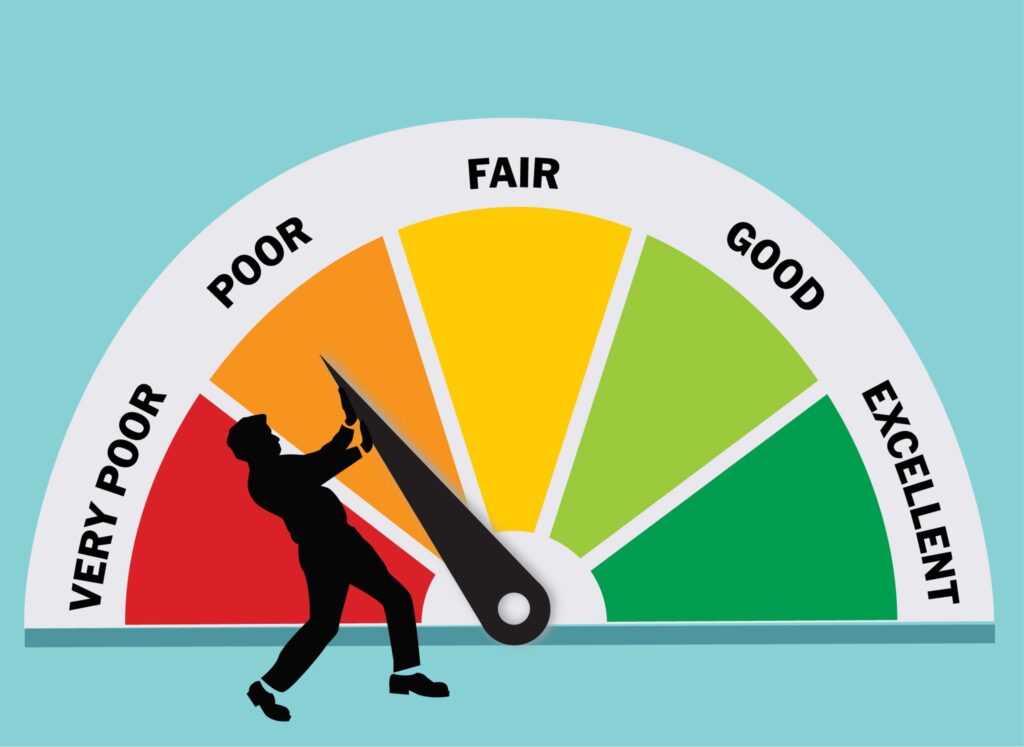The Illusion of Credit Scores
Credit scores are often touted as a crucial indicator of financial health, but I’m convinced they’re a complete joke. On the surface, credit scores seem important—they determine your ability to get loans, the interest rates you’ll pay, and even your ability to rent an apartment or get a job. However, when you dig deeper, you’ll find that these scores primarily measure how well you handle debt, rather than your overall financial health.
Think about it: a high credit score simply indicates that you’ve managed your debt well, not that you’re financially secure or savvy. It’s possible to have a stellar credit score and still be living paycheck to paycheck, with minimal savings and investments. Conversely, someone with a lower credit score might be financially stable, debt-free, and investing wisely.

Credit scores focus on how much debt you have, how timely you are with your payments, and how long you’ve been in debt. They don’t account for your savings rate, your investment portfolio, or your net worth—all critical indicators of true financial health. This focus on debt management rather than overall financial well-being is fundamentally flawed.
For instance, consider the insights from Why the Rich Stay Rich: The $25,000 Financial Experiment. This experiment demonstrates that financial success is more about habits, mindset, and education than simply handling debt well. It’s not the credit score that keeps the wealthy, wealthy—it’s their comprehensive approach to managing and growing their finances.
In this article, I’ll delve into why credit scores are not the ultimate measure of financial health. We’ll explore the pitfalls and limitations of credit scores, hear from financial experts, and discuss better indicators of financial well-being. By the end, I hope to convince you that while credit scores have their uses, they shouldn’t be the end-all and be-all of financial assessment.
The Basics of Credit Scores
To understand why credit scores are flawed, it’s essential to first grasp what they are and how they’re calculated. A credit score is a three-digit number that lenders use to assess your creditworthiness. This number ranges from 300 to 850, with higher scores indicating better creditworthiness. But what does this number really measure?
How Credit Scores Are Calculated
Credit scores are calculated based on several factors, each weighted differently:
- Payment History (35%): This is the most significant factor. It tracks whether you’ve paid your past credit accounts on time. Late payments, defaults, and bankruptcies negatively impact this component.
- Credit Utilization (30%): This measures how much of your available credit you’re using. Lower utilization rates are better for your score.
- Length of Credit History (15%): The longer you’ve been using credit, the better. This includes the age of your oldest account, the age of your newest account, and the average age of all your accounts.
- New Credit (10%): Opening several new credit accounts in a short period can lower your score, as it may indicate higher risk.
- Types of Credit (10%): A mix of different types of credit accounts (credit cards, mortgages, auto loans) is favorable.
These factors are focused almost exclusively on how you manage debt. They don’t account for other critical aspects of financial health, such as your savings, investments, or overall net worth. This narrow focus is why a high credit score can be misleading.

The Focus on Debt Management
Credit scores primarily measure your ability to handle debt. They reward behaviors like making minimum payments on time and keeping credit card balances low relative to your credit limit. However, this doesn’t necessarily mean you’re financially healthy or stable. You could be juggling multiple debts efficiently yet have little to no savings or investments.
For example, someone might have a high credit score because they always pay their credit card bills on time and maintain a low credit utilization rate. But if they have no emergency fund, minimal retirement savings, and no investment portfolio, are they truly financially healthy? The answer is likely no.
On the flip side, someone with a moderate credit score might be debt-free, have substantial savings, and invest wisely. This person is likely in a much better financial position, yet their credit score doesn’t fully reflect their financial health.
Understanding these limitations helps us see why credit scores should not be the sole measure of one’s financial well-being. For those looking to dive deeper into improving their credit score while managing debt responsibly, How to Boost Your Credit Score 100+ Points in 30 Days Without Credit Repair! offers practical tips.
In the next section, we’ll discuss why credit scores are more about managing debt than measuring true financial health and explore the implications of this narrow focus.

Credit Scores: Measuring Debt Management, Not Financial Health
Credit scores are often touted as an essential gauge of financial health, but in reality, they primarily measure how well you manage debt. This distinction is crucial because it reveals the inherent limitations and potential pitfalls of relying on credit scores as the sole indicator of one’s financial well-being.
Debt Management vs. Financial Health
A high credit score indicates that you’ve managed your debt effectively—paying bills on time, keeping balances low, and maintaining a long credit history. While these are positive behaviors, they don’t tell the whole story about your financial health. Let’s break down why:
- Focus on Debt: Credit scores reward behavior that reflects good debt management. This includes making minimum payments on time and using a small percentage of your available credit. However, it doesn’t consider your savings, investments, or other assets.
- No Insight into Savings: A person with a high credit score might still have minimal savings or an inadequate emergency fund, leaving them vulnerable to financial shocks.
- Ignoring Investments: Credit scores don’t account for how well you invest your money. A high score doesn’t reflect whether you’re growing your wealth through investments like stocks, bonds, or real estate.
- Net Worth Blind Spot: Your net worth—total assets minus total liabilities—is a critical measure of financial health that credit scores don’t capture. Someone might have a great credit score but a negative net worth due to high debt levels.
Misleading Nature of High Credit Scores
It’s possible to have a high credit score while being financially insecure. For instance, you might be living paycheck to paycheck, with high living expenses and little room for savings or investments. On the other hand, someone with a lower credit score might be debt-free, have a healthy savings account, and be on track with their retirement planning.
The article 8 Wealth-Destroying Habits to Ditch for Financial Freedom emphasizes the importance of good financial habits beyond just maintaining a high credit score. Avoiding these wealth-destroying habits can lead to genuine financial health and stability.

The Right Use of Debt
Debt isn’t inherently bad; it’s how you use it that matters. For example, taking on debt to invest in a business or real estate can be a strategic move if managed well. However, accumulating high-interest consumer debt without a plan can be detrimental. Understanding this nuance is key to leveraging credit wisely.
Example:
- Good Debt: Taking out a business loan to scale operations can lead to higher revenues and long-term financial gains.
- Bad Debt: Maxing out credit cards for non-essential purchases can lead to financial strain and high-interest payments.
For entrepreneurs, knowing how to strategically use debt can make a significant difference. Check out Earning Big with Digital Downloads: My $1,000 Monthly Shopify Success Story for insights into leveraging credit for business growth.
Final Thoughts on Debt Management
While managing debt effectively is important, it’s only one piece of the financial health puzzle. True financial stability comes from a balanced approach that includes saving, investing, and prudent spending. Relying solely on credit scores can be misleading and may not accurately reflect your overall financial situation.
Understanding these limitations is crucial for anyone looking to achieve genuine financial health. In the next section, we’ll dive deeper into the specific pitfalls and limitations of credit scores and why they might not be the best indicator of financial well-being.
The Pitfalls of Credit Scores
Credit scores, while useful for certain purposes, have significant limitations that can lead to a misleading picture of one’s financial health. Understanding these pitfalls is essential for recognizing why credit scores are not the ultimate measure of financial well-being.
Flaws and Limitations of Credit Scores
- Narrow Focus: Credit scores focus solely on debt management. They do not account for your savings, investments, or overall financial stability. This narrow focus can be deceptive, as it only shows how well you handle debt, not how well you build and manage wealth.
- Misleading High Scores: A high credit score can give a false sense of security. It’s possible to have a stellar credit score while living paycheck to paycheck, with little to no savings or investments. This scenario underscores the importance of looking beyond the score to gauge financial health.
- Discrepancies and Errors: Credit reports can contain errors that negatively impact your score. Inaccurate reporting, identity theft, and clerical mistakes can all lead to a lower score that doesn’t accurately reflect your financial behavior.
- No Context: Credit scores don’t provide context for your financial decisions. For instance, taking on debt to cover medical expenses is vastly different from racking up credit card debt on luxury purchases, yet both scenarios can affect your score similarly.
- Penalizing Inactivity: Ironically, those who avoid debt entirely may have lower credit scores due to a lack of credit history. This penalizes financially prudent individuals who prefer to save and invest rather than borrow.
Misleading Nature of Credit Scores
Consider this: Someone with a high credit score might be adept at juggling multiple credit cards and loans but could be one financial emergency away from disaster. On the other hand, someone with a lower score might be debt-free, have substantial savings, and be on track for retirement.
The article 8 Wealth-Destroying Habits to Ditch for Financial Freedom highlights how avoiding bad financial habits can lead to genuine financial freedom, irrespective of one’s credit score. These habits focus on building wealth through savings, investments, and prudent financial management.
The Inaccuracies and Discrepancies in Credit Scores
Credit scores are also susceptible to inaccuracies and discrepancies. Errors in credit reports are common and can unfairly lower your score. It’s important to regularly check your credit report and dispute any inaccuracies to ensure your score accurately reflects your financial behavior.
For those looking to boost their credit score quickly and correctly, How to Boost Your Credit Score 100+ Points in 30 Days Without Credit Repair! offers practical advice.
The Bigger Picture of Financial Health
True financial health encompasses more than just a credit score. It includes having a robust emergency fund, growing investments, and maintaining a positive net worth. These elements provide a more comprehensive picture of financial stability and success.
For example, maximizing your Social Security benefits can significantly impact your long-term financial health. The article Unlocking Your Social Security at 62: A Strategy for Million-Dollar Return offers strategies to ensure you get the most out of your benefits.
In summary, while credit scores have their place, they are not the definitive measure of financial health. Recognizing their limitations and focusing on a broader approach to financial management can lead to true financial stability and success.

Expert Opinions on Credit Scores
When it comes to understanding the limitations of credit scores, it’s crucial to consider the insights and opinions of financial experts. Many prominent financial advisors and economists have voiced concerns about the overreliance on credit scores as a measure of financial health.
Insights from Financial Experts
- Dave Ramsey: Personal finance guru Dave Ramsey is a vocal critic of the credit scoring system. He argues that credit scores are primarily a reflection of one’s relationship with debt rather than an indicator of financial health. Ramsey advocates for a debt-free lifestyle, emphasizing the importance of building wealth through saving and investing rather than maintaining a high credit score.
- Suze Orman: Suze Orman, another well-known financial advisor, has highlighted the limitations of credit scores. She points out that credit scores do not consider important aspects of financial health such as savings, investments, and overall financial planning. Orman encourages individuals to focus on their net worth and long-term financial goals rather than obsessing over their credit score.
- Mark Cuban: Billionaire entrepreneur Mark Cuban has also weighed in on the topic, stating that credit scores can be misleading. Cuban emphasizes the importance of financial literacy and smart money management over simply aiming for a high credit score. He believes that understanding personal finance fundamentals is far more valuable.
Quotes and Opinions
- Dave Ramsey: “Your credit score is nothing but an ‘I love debt’ score. It’s not a measure of winning financially.”
- Suze Orman: “A high credit score doesn’t mean you’re wealthy or financially secure. It just means you know how to manage debt.”
- Mark Cuban: “Don’t focus on your credit score. Focus on learning how to manage your money wisely.”
These experts underscore the importance of looking beyond credit scores and focusing on comprehensive financial health. Their perspectives highlight the need for a broader understanding of financial well-being that includes saving, investing, and prudent financial planning.
Practical Advice from Experts
Experts also offer practical advice for improving overall financial health:
- Focus on Savings: Building a robust emergency fund is crucial for financial security. Aim to save three to six months’ worth of living expenses.
- Invest Wisely: Diversify your investments to include stocks, bonds, and real estate. Long-term investing can significantly grow your wealth.
- Avoid Unnecessary Debt: While some debt can be strategic (e.g., a mortgage or business loan), avoid high-interest consumer debt that can lead to financial strain.
For a more detailed exploration of smart financial strategies, check out Maximizing Profits: My Insider Guide to Selling on Shopify vs. Amazon. This guide offers insights into leveraging e-commerce platforms to build wealth.
The Real Measures of Financial Health
True financial health is measured by more than just your ability to manage debt. It includes:
- Net Worth: The total value of your assets minus your liabilities. This provides a clear picture of your financial standing.
- Savings Rate: The percentage of your income that you save and invest. A higher savings rate indicates strong financial discipline.
- Investment Growth: The rate at which your investments grow over time. This reflects your ability to build wealth.
Understanding these real measures of financial health can help you achieve long-term financial success. In the next section, we’ll explore how debt impacts credit scores and discuss the difference between good and bad debt.
The Role of Debt in Credit Scores
Debt plays a central role in determining your credit score. How you manage your debt—how much you take on, how you pay it back, and the types of debt you carry—directly impacts your score. However, it’s crucial to understand the distinction between good debt and bad debt and how each influences your financial health and credit score.
How Debt Impacts Credit Scores
- Payment History (35%): This is the largest component of your credit score. Timely payments on credit cards, loans, and other debt boost your score, while late payments, defaults, and bankruptcies harm it.
- Credit Utilization (30%): This factor measures the amount of available credit you’re using. Lower utilization rates are better for your score, as they indicate you’re not overly reliant on credit.
- Length of Credit History (15%): The longer you’ve been using credit responsibly, the higher your score. This includes the age of your oldest account and the average age of all your accounts.
- New Credit (10%): Opening several new credit accounts in a short period can lower your score, as it may suggest you’re taking on too much debt too quickly.
- Types of Credit (10%): A mix of credit types (e.g., credit cards, mortgages, auto loans) is beneficial for your score.
While these factors highlight the importance of managing debt well, they don’t provide a complete picture of your overall financial health.
Good Debt vs. Bad Debt
Understanding the difference between good debt and bad debt is crucial for effective financial management:
- Good Debt: This includes loans that are used to finance investments that generate long-term value. Examples include:
- Mortgages: Buying a home can be a good investment, as real estate often appreciates over time.
- Student Loans: Investing in education can lead to higher earning potential and better career opportunities.
- Business Loans: Borrowing to start or expand a business can lead to increased income and growth.
- Bad Debt: This includes debt incurred for non-essential or depreciating items, which often carry high-interest rates. Examples include:
- Credit Card Debt: High-interest rates on unpaid balances can quickly lead to financial trouble.
- Personal Loans for Luxury Items: Borrowing for vacations, expensive electronics, or other luxury items that don’t appreciate in value can be financially detrimental.
Managing good debt responsibly can help build wealth and improve your credit score, while bad debt can lead to financial instability.
Strategic Use of Debt for Business Scaling
Debt isn’t inherently bad; it’s how you use it that matters. For instance, taking on debt to invest in a business can be a strategic move if managed well. Successful entrepreneurs often use debt to scale their operations faster and generate higher returns. The article Earning Big with Digital Downloads: My $1,000 Monthly Shopify Success Story illustrates how leveraging credit for business growth can lead to significant profits.
Implications for Personal Finance
Using debt wisely means understanding its impact on your credit score and your overall financial health. It’s essential to:
- Maintain Low Credit Utilization: Aim to use less than 30% of your available credit to keep your score healthy.
- Make Timely Payments: Always pay your bills on time to avoid penalties and negative impacts on your score.
- Diversify Your Credit: Having different types of credit can positively affect your score, but only take on what you can manage responsibly.
Understanding the role of debt in credit scores and its broader implications for financial health can help you make informed decisions and maintain a balanced financial profile.

Alternatives to Credit Scores for Measuring Financial Health
While credit scores focus on debt management, they overlook many other important aspects of financial health. To get a more comprehensive picture of financial well-being, it’s essential to consider additional indicators such as savings, investments, and overall net worth.
Key Indicators of Financial Health
- Net Worth
- Definition: Net worth is calculated by subtracting your total liabilities from your total assets. It provides a snapshot of your overall financial standing.
- Importance: Unlike credit scores, net worth takes into account your savings, investments, property, and other assets, offering a complete view of your financial health.
- Tracking: Regularly tracking your net worth can help you gauge your financial progress and make informed decisions about spending, saving, and investing.
- Savings Rate
- Definition: The percentage of your income that you save and invest regularly.
- Importance: A higher savings rate indicates strong financial discipline and the ability to prepare for future financial needs and emergencies.
- Goal: Aim to save at least 20% of your income, adjusting as necessary based on your financial goals and circumstances.
- Investment Portfolio
- Definition: The collection of assets such as stocks, bonds, real estate, and other investments.
- Importance: A diversified investment portfolio helps grow wealth over time and provides financial security.
- Strategy: Focus on long-term growth and regularly review and rebalance your portfolio to align with your financial goals.
- Emergency Fund
- Definition: A savings account with enough funds to cover three to six months’ worth of living expenses.
- Importance: An emergency fund acts as a financial safety net, protecting you from unexpected expenses and financial emergencies.
- Building: Consistently save a portion of your income until your emergency fund is fully established.
- Debt-to-Income Ratio
- Definition: The percentage of your monthly income that goes toward paying debts.
- Importance: A lower debt-to-income ratio indicates better financial health and borrowing capacity.
- Management: Aim to keep your debt-to-income ratio below 36% to maintain financial stability and improve borrowing terms.
For those looking to maximize their retirement benefits, understanding how Social Security fits into your overall financial picture is crucial. The article Unlocking Your Social Security at 62: A Strategy for Million-Dollar Return provides valuable insights into optimizing this important resource.
Comprehensive Financial Planning
Effective financial planning involves balancing all aspects of your financial life. Here are some tips:
- Set Financial Goals: Define short-term and long-term financial goals to guide your saving and investing strategies.
- Create a Budget: Track your income and expenses to ensure you’re living within your means and saving for future goals.
- Invest Wisely: Diversify your investments to reduce risk and enhance growth potential.
- Monitor Progress: Regularly review your financial status and adjust your strategies as needed to stay on track.
For a more detailed guide on leveraging financial tools and platforms, check out Maximizing Profits: My Insider Guide to Selling on Shopify vs. Amazon. This guide offers insights into optimizing income streams and building wealth through strategic use of digital platforms.
Understanding these alternatives to credit scores can provide a more accurate and comprehensive picture of your financial health. By focusing on these indicators, you can build a more secure and prosperous financial future.
Rethinking Credit Scores
Credit scores have long been regarded as the ultimate measure of financial health, but it’s clear that they are far from perfect. While they serve a purpose in evaluating how well you manage debt, they fail to provide a comprehensive picture of your overall financial well-being.
Recap of Key Points
- Credit Scores and Debt Management: Credit scores primarily reflect how well you handle debt, not your entire financial health. This narrow focus can be misleading, as a high credit score doesn’t necessarily mean you’re financially secure.
- Limitations and Pitfalls: Credit scores have significant limitations, including inaccuracies, lack of context, and the penalization of financially prudent behaviors. They don’t account for crucial factors like savings, investments, and net worth.
- Expert Insights: Financial experts like Dave Ramsey, Suze Orman, and Mark Cuban emphasize the importance of financial literacy and prudent money management over obsessing about credit scores.
- Good Debt vs. Bad Debt: Understanding the difference between good and bad debt is crucial. Strategic use of debt for business scaling and investments can be beneficial, while high-interest consumer debt can be detrimental.
- Comprehensive Financial Health: True financial health encompasses a range of factors, including net worth, savings rate, investment portfolio, emergency fund, and debt-to-income ratio. These indicators provide a more accurate picture of your financial stability.
Moving Forward
To achieve genuine financial health, it’s essential to focus on a holistic approach that goes beyond credit scores. Here are some actionable steps:
- Prioritize Savings and Investments: Build a robust emergency fund and invest wisely to grow your wealth over time.
- Monitor Your Net Worth: Regularly track your net worth to understand your overall financial standing and progress.
- Educate Yourself: Continuously improve your financial literacy by reading books, attending workshops, and using online resources. For instance, The Total Money Makeover: Classic Edition: A Proven Plan for Financial Fitnessoffers practical advice on building financial health.
- Avoid Bad Debt: Minimize high-interest consumer debt and focus on strategic use of debt for investments and business growth.
- Diversify Income Streams: Explore opportunities to diversify your income, such as investing in stocks, real estate, or starting a side business. Check out Maximizing Profits: My Insider Guide to Selling on Shopify vs. Amazon for tips on leveraging e-commerce platforms.
By adopting these practices, you can build a strong financial foundation that goes beyond the limitations of credit scores. It’s time to rethink how we measure financial health and focus on the broader aspects that truly reflect financial stability and success.
For more insights and practical strategies on managing your finances, explore the following resources:
- Why the Rich Stay Rich: The $25,000 Financial Experiment
- How to Boost Your Credit Score 100+ Points in 30 Days Without Credit Repair!
- Unlocking Your Social Security at 62: A Strategy for Million-Dollar Return
Understanding that credit scores are just one piece of the financial puzzle can empower you to make more informed and comprehensive financial decisions. Focus on building wealth, maintaining financial discipline, and achieving long-term stability.



